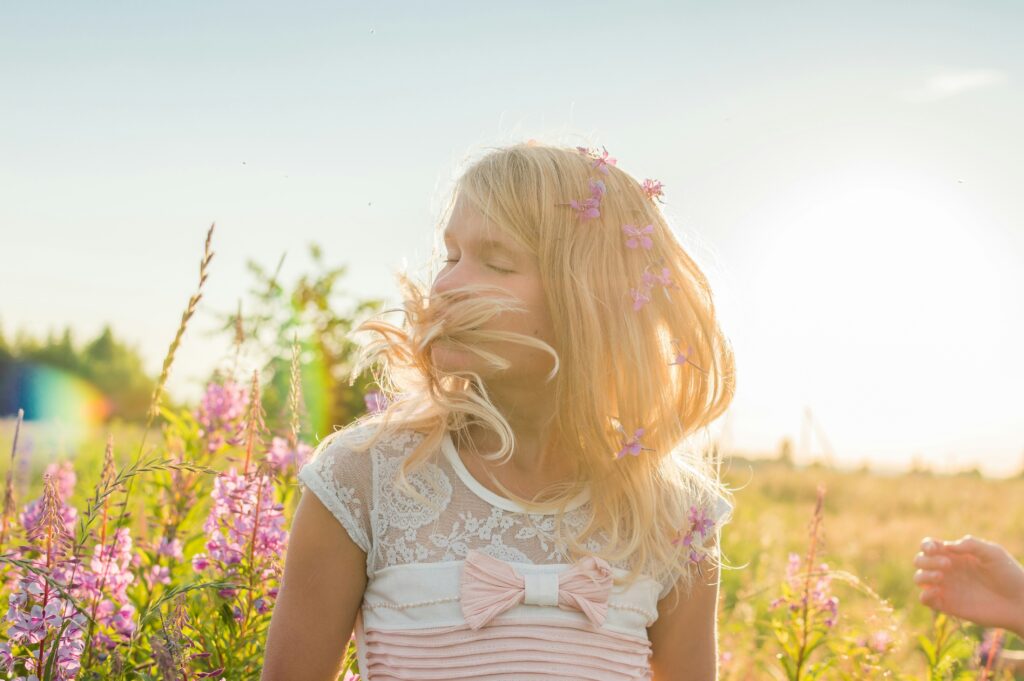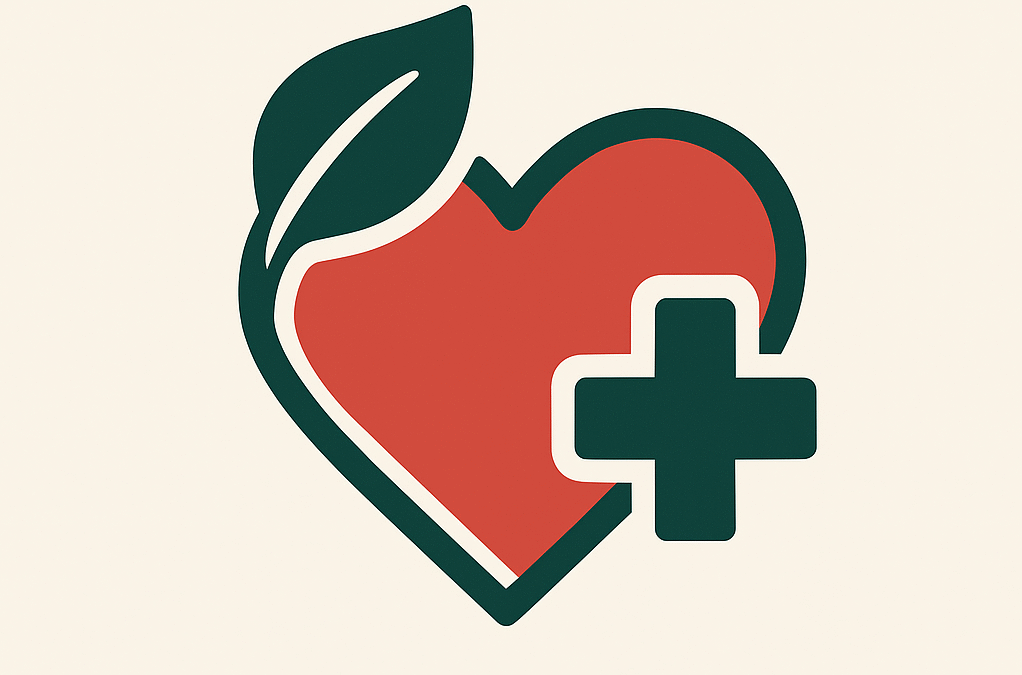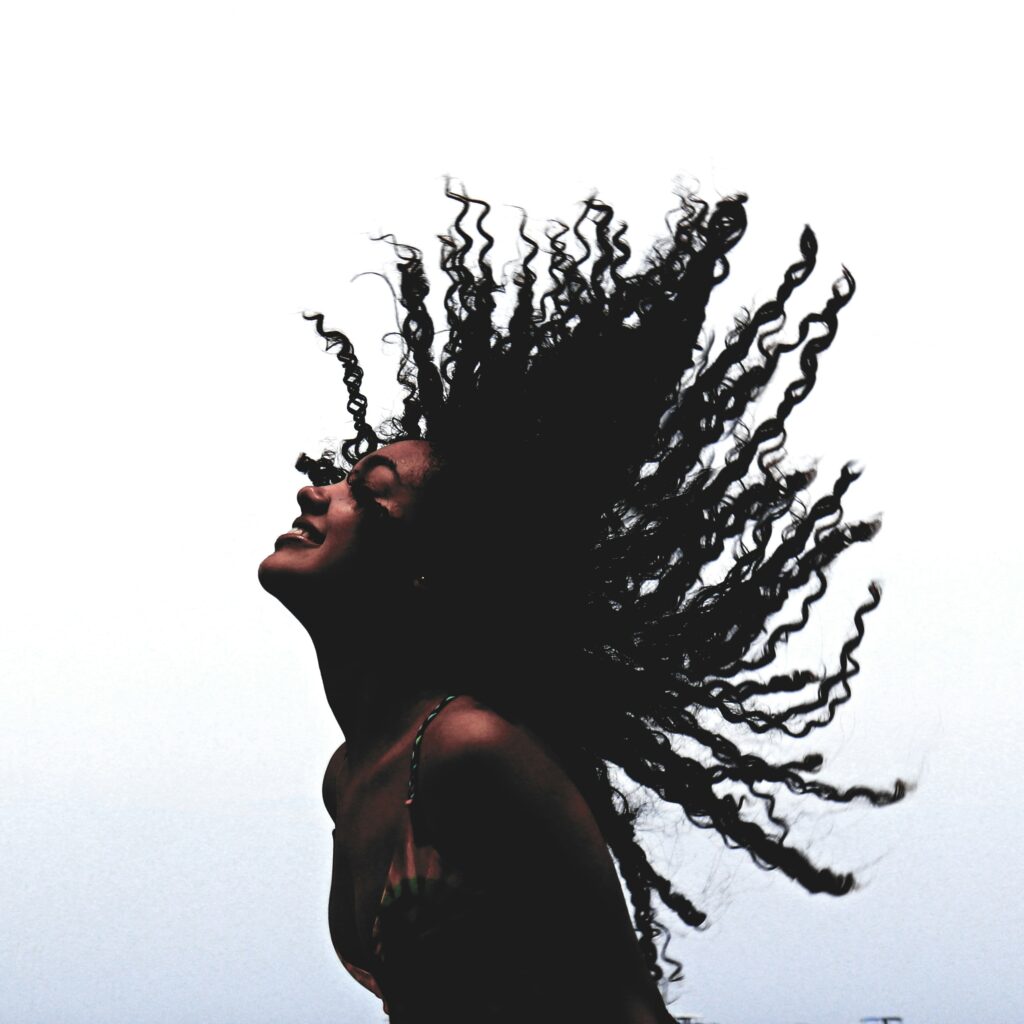
Your hair is more than just strands of keratin; it’s your crown, your statement of beauty and style. Whether you prefer to keep it long and flowing or opt for a trendy pixie cut, your hair plays a significant role in shaping your appearance. And when it comes to maintaining its health and vitality, Ayurveda offers a treasure trove of wisdom.
In Ayurveda, hair, referred to as Kesha, is viewed as a byproduct of Asthi Dhatu, or bone tissue, while certain scholars suggest its association with Majja Dhatu, or bone marrow. Imbalances in the Doshas—Vata, Pitta, and Kapha—can manifest as various hair concerns. Excess Vata Dosha may lead to dryness and brittleness, while Pitta Dosha imbalance can result in premature graying and hair loss. On the other hand, excessive Kapha Dosha can lead to an oily scalp and limp hair.
Assess the current state of your hair!
Before diving into any hair care regimen, it’s crucial to assess the current condition of your hair. A simple observation after washing and air-drying can provide valuable insights. Poofy and dry hair signals Vata Dosha imbalance, while oily roots indicate Kapha Dosha dominance. Excessive hair fall or lackluster locks often point to vitiation of Pitta Dosha!
May be you are born with it!
In many cases due to overuse of chemical treatments, excessive heat styling and poor nutrition can result in damaged tresses. However, it is to be kept in mind that Prakriti or the natural state of Dosha within each individual can define the external appearance of hair, just like genetics. Therefore, deciphering your Prakriti, or unique constitution, is integral to personalized hair care. A Prakriti assessment helps tailor treatments to suit individual needs, ensuring optimal results.
Typically, If your hair falls under the dominance of Vata, it’s probable that it will be thin, rough, and possibly frizzy, with a texture that feels low in density. When Vata becomes aggravated, this type of hair may experience increased brittleness, leading to hair loss, along with issues like dandruff and split ends.
Those with dominant Pitta have straight to wavy hair of medium length and normal strength. Vitiated Pitta can cause premature greying and excessive hair fall. If Kapha is dominant, then probably you will be having thick hair but if not taken proper care, can lead to excessive oiliness, and scalp buildup.
Ayurvedic principles emphasize the importance of aligning diet and lifestyle with desired qualities. If you seek to enhance certain aspects of your hair, your habits should reflect those attributes. Conversely, if you aim to mitigate the effects of Doshic imbalances, adopting contrasting dietary and lifestyle practices is essential.
So, what’s next!
After discerning your hair type, it is important to know that is there any secondary cause for that damage if any. Avoid all such factors as much as possible! Now, I am not saying that you should never style your hair the way you want to but keep a check on those! Follow these time proof Ayurvedic tips for unlocking those beautiful tresses!!
Take care of your digestion. Period!
In Ayurveda, digestive power is the main player in causation and alleviation of Dosha vitiation. It not only covers the basic digestion of food but also at cellular level metabolism. So, take care what you take in!
Eat as per the seasonal regimen and respect your circadian rhythm. A well regulated daily and seasonal rhythm is imperative for optimum health.
In addition to dietary recommendations, Ayurveda offers a range of herbs specifically beneficial for hair health. These herbs can be used both internally and externally, either individually or in combination with other ingredients. Some notable herbs known for promoting and revitalizing hair in Ayurveda include Amalaki, Bhringraja, Brahmi, Neem, Shikakai, and Mulethi.
However, it’s essential to approach their usage with caution and seek guidance from a qualified Ayurvedic practitioner before incorporating them into your routine.
Once you have covered the internal, its time for external care or if you can , do these simultaneously.
Oil Massages!! <3
Oil is a wonderful substance. In the ancient texts, it is mentioned as Sneha which means love. Using it in your daily life is indeed at par with love. Regularly oiling with the right kind of oil and with right technique has been proven beneficial time and again for luscious locks ! It has been advocated as a part of t he daily regimen or the Dincharya.
Especially for those grappling with dry, brittle hair, nurturing it with proper oil conditioning is paramount. Oils offer a natural solution to manage Vata Dosha imbalance. Some oils which can be used for oil massaging your scalp are:
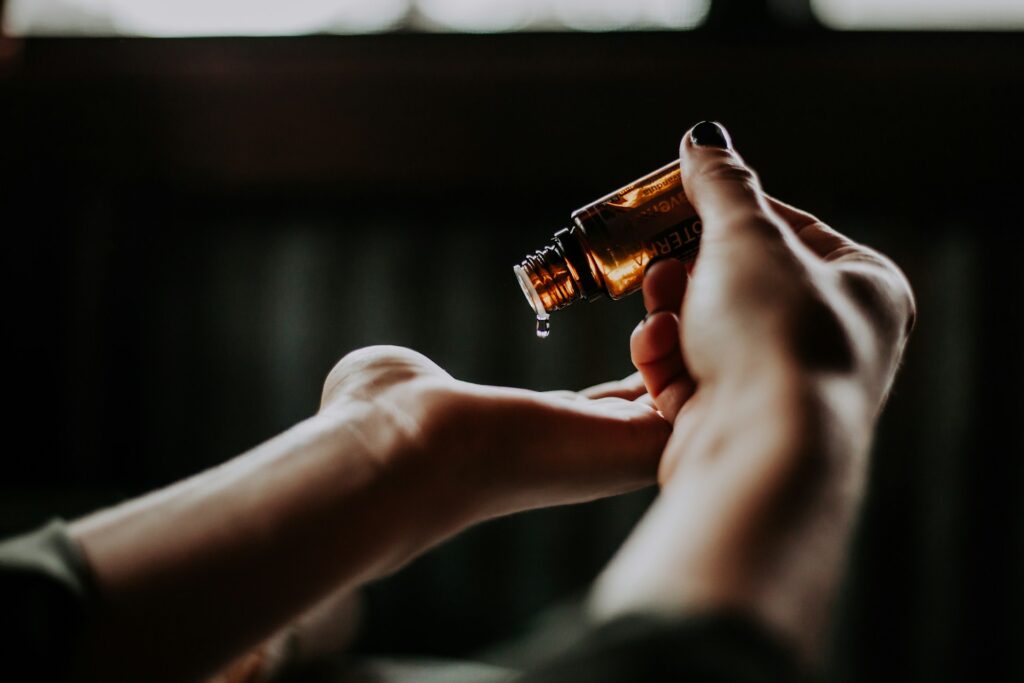
- Sesame Oil: Renowned for its nourishing properties, sesame oil is ideal for Abhyanga (massage). Rich in fatty acids, it penetrates the hair shaft, strengthening it with regular use. Its one of the best oil to balance Vata because of its nourishing agents and hot potency.
- Coconut Oil: Cold-pressed coconut oil is a staple in coastal regions for its cooling properties. Its Sheeta Virya (cold potency) nature makes it particularly beneficial in hot climates, promoting healthy hair and skin. Attributing to these properties, it is an optimum choice for Pitta Dosha vitiation and being a powerhouse of moisture and nourishment , it also soothes Vata Dosha.
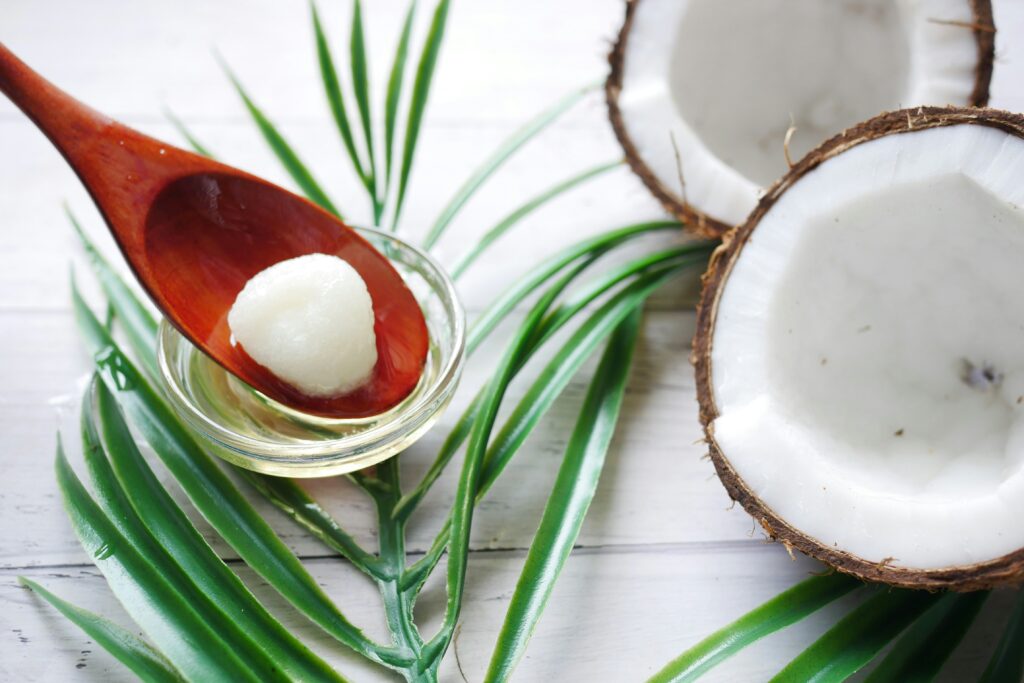
3. Almond Oil: Almonds are nothing short of small powerhouse of nutrients. Oil extracted from almonds have excellent penetrating properties. Enriched with lipoproteins, Omega 3 fatty acids, and Vitamin E, almond Oil aids in fostering hair growth by both softening and fortifying hair follicles. Along with that it hydrates the hair and controls frizz. It is thus a great choice for people with dry and frizzy hair.
4. Mustard Oil: Best suited for dry hair in colder climates, mustard oil offers relief for itchy scalps and enhances overall hair health. So, if your hair is having Kapha Dosha in excess, it can support nourishment and being hot and pungent in nature, also reduces scalp buildup with time.
Incorporating these oils into your hair care routine can work wonders in restoring balance and vitality to your locks. Another awesome thing about your beloved oils is that it can easily take up beneficial properties from other herbs, thus giving you herb infused oils. Commonly used herbs are Bhringraj, Amalaki, Japapushpa, Shikakai, curry leaves etc. These oils have addedd benefit of these herbs with the natural properties of the base oil.
Hair packs! 🙂
Application of hair masks is a noteworthy step in your hair care game. It is a wonderful way to incorporate benefits of hair healthy herbs into your hair. Hair masks in general can have various advantages like
- Deep conditioning
- Enhanced shine and softness
- Surged in the moisture levels
- Decreased hair breakage and damage
- Reduction in frizz
- Promotion of a healthier scalp
- Strengthening of the hair strands

It is obvious without saying that , these effects will depend on the ingredients of the mask and also your hair type.
Nowadays, many reputed Ayurvedic companies are selling premixed and preformed hairmasks but if you like to get your hands dirty then there are some commonly available ingredients which can prove to be a key to unlock those luscious locks!
Hair Rinses! 😀
Now, when you have nourished your hair with oil massages or hair packs, its time to wash it off! There are a plenty of shampoos available in the market for the purpose. Some are great and some are well, not so great for your hair or your scalp health.
Shampoos are mere soaps for your hair but they don’t need to be stripping your hair of its natural sheen or worse, coating it leading to dull looking hair and scalp buildup!
So, choose a shampoo which is having sulfate- free mild surfactants. You can however use a sulfate based shampoo once a week if you are prone to scalp build-up.
Also avoid shampoos and conditioners with silicon. These are supposed to fill in the tiny gaps in your hair but oftentimes it causes buildup, weighing your hair down!
There are some commonly used hair rinses in Ayurveda which are milder and can do the job of cleansing very well. And also does not burn a hole in your pocket.
The old trick in the hat- Reetha, Shikakai and Amalaki
Unlock the secret to healthy, luscious hair with a homemade herbal hair rinse featuring the cleansing power of reetha, also known as soapnut. It is pungent in nature and acts a natural surfactant.
Shikakai, renowned for its conditioning properties and natural soap-like qualities, strengthens your hair with consistent use. However, when used alone, it can sometimes lead to dryness. That’s where Amalaki, the modern-day elixir, steps in. Amalaki provides the hydration and nourishment your hair craves, leaving it soft, strong, and oh-so-gorgeous.
Crafted with precision, this blend delivers a rich lather and thorough cleansing without the harsh chemicals found in commercial products. Say hello to naturally beautiful hair with this simple, cost-effective solution from Mother Nature herself. But remember, handle with care – this can irritate the eyes!!
Simple and effective- Triphala
Say goodbye to dry, itchy scalps and hello to nourished hair with Triphala, aptly named for its trio of potent herbs – Amalaki, Vibhitaki, and Haritaki – is a powerhouse blend renowned for its myriad health benefits. Harnessing the power of nature, this concoction boasts a balanced ratio of 1:1:1 w/w, offering a symphony of healing properties.
Whether your hair is parched from the elements or your scalp is craving relief, this herbal rinse offers a simple yet effective solution. Just mix the readily available powder or opt for dried fruits of the three herbs, soak them overnight, and let them simmer to perfection come morning.
Use it as a post shampoo hair wash on oily hair days and on days you have not oiled your hair, a thorough wash with this concoction will suffice.
Conclusion
Ayurveda embraces a holistic philosophy, recognizing the profound connection between mind, body, and spirit. Your external appearance often reflects the state of your internal well-being, and your hair, often considered your crown, is no exception. It deserves extra care and attention to maintain its health and vitality.
By nurturing a healthy gut and incorporating time-tested Ayurvedic herbs and practices into your routine, you can address hair concerns from the root. Bid farewell to hair woes and let your locks shine with radiance, serving as a testament to the harmony you cultivate within. Embrace Ayurveda’s holistic approach to wellness, and watch as your hair flourishes with health and vibrancy.
